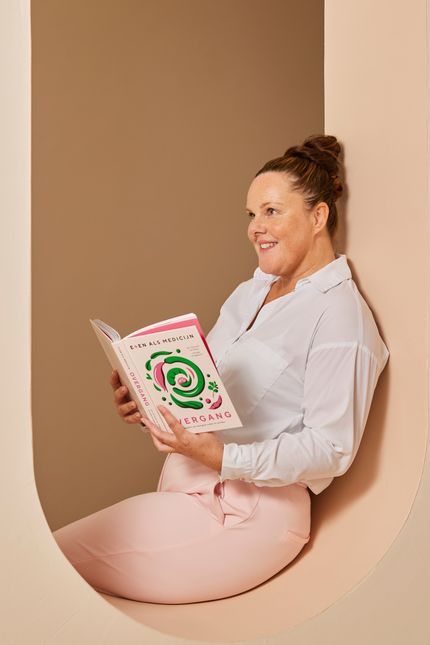Painful legs and menopause
Tired and painful legs is not a classic menopausal phenomenon. However, many women experience leg pain during perimenopause and menopause. It can manifest as leg aches or cramping. Or your legs may feel heavy, tired or sore. What causes leg pain? And what can you do about it?

Since perimenopause, my legs feel tired and heavy when I get up in the morning. I try to stay active and go for walks regularly. What else can I do? - Elke (age 53)

Are you going through menopause and do your legs feel heavy, tired and achy? If they do, you're not alone. Many menopausal women report having leg problems, with symptoms ranging from stiffness and joint pain to leg heaviness, fatigue and cramping.
Leg pain can have different causes and how the symptoms develop over time can vary. During perimenopause, hormone fluctuations tend to be the most volatile. When these fluctuations even out in postmenopause, most symptoms settle or disappear. But we have good news: you don’t have to wait for so long. There are things you can do to alleviate or prevent leg pain and fatigue.
What is happening in your body?
In the years leading up to menopause, the ovaries gradually produce less of the female sex hormones oestrogen and progesterone. Oestrogen plays an important role in keeping cartilage and bones healthy, strong and supple. When you lose oestrogen, your joints, bones and muscles can become affected. This can result in painful or stiff legs and feet, joint pain and muscle aches.
Do your legs feel tired, heavy or crampy? This, too, can be caused by falling oestrogen levels. Oestrogen is also important for blood circulation. A decline in oestrogen production can lead to narrowing of the blood vessels that supply blood to the legs, resulting in tired or heavy legs.
In perimenopause, when progesterone levels drop faster than oestrogen levels, an oestrogen dominance can occur. Oestrogen is a fluid-retaining hormone, so high levels may lead to water retention. This, too, can cause your legs to swell, or feel tired and heavy.
Other causes of heavy, painful legs
It is possible that leg pain is not caused by changes in hormone levels. It could also result from other symptoms of menopause. Do you suffer from hot flashes and night sweats? When you sweat, you naturally lose nutrients, like magnesium. Magnesium deficiency can increase inflammation and impair blood circulation and muscle and nerve function. This can increase the risk of leg pain and heaviness.
Some women have naturally heavy periods. Periods may also become heavier during perimenopause. Heavy menstrual bleeding can lead to iron deficiency. Iron is an important mineral that transfers oxygen from the lungs to the muscles and organs to keep them functioning properly. The muscles require a lot of blood and oxygen to function. Oxygen deprivation causes them to work overtime and cause fatigue, weakness or pain in the legs, especially during physical activity.
What can you do?
Some minor lifestyle changes can greatly improve the feeling of tired or heavy legs and feet. Some tips:
- Exercise regularly. Stay active, even if leg pain makes it harder to move. Regular exercise will improve your muscle strength and keep your joints supple and your bones strong. Get at least 30 minutes of physical activity a day (swimming, cycling or walking are good ways to stay in motion) and do strength training twice a week.
- Relax your muscles on a regular basis. Hot baths or showers are recommended. Heat relaxes the muscles. Massage is also good for relaxing tight muscles – and who doesn't love a good massage?
- Support your body with a magnesium supplement. Magnesium contributes to energy production and helps maintain nerve and muscle function and bone health. Choose a supplement with magnesium citrate for optimal absorption by your body.
- Increase your intake of omega-3 fatty acids. Omega-3 fatty acids have anti-inflammatory properties and, therefore, are useful in the management of leg pain. Try eating fatty fish twice a week. If this is a problem, you may want to take an omega-3 supplement.
- Avoid inflammatory foods. Processed foods like mayonnaise, soft drinks, cakes and red and processed meats are high in sugar, saturated fat and trans fats. These foods cause or exacerbate inflammation. Try to eat more fruit and vegetables, protein and healthy fats, and cut back on carbohydrates.
- Get your Vitamin D levels checked. Vitamin D plays a crucial role in maintaining healthy bones and muscles. A high-quality Vitamin D supplement can be a good way to ensure your body gets what it needs.
- Do you have heavy periods? Have an iron test to check for anaemia. You may experience heavy legs because your iron levels are too low. Taking a high-quality iron supplement can help correct this deficiency and ensure your body has enough healthy red blood cells — and thus, oxygen. Don't just grab any supplement off the shelf. It’s important to know what your body needs in order to prevent adverse effects.
Your path to a smooth menopause starts here
Get the tools you need to navigate menopause with more ease and to educate yourself about your body. With tips and insights from experts, and relatable stories of women just like you. Press play, not pause.
What treatments can help?
Minor lifestyle adjustments can make a big difference when it comes to leg pain or heavy legs and feet. A healthy lifestyle with plenty of exercise is the foundation for good health. If making lifestyle changes doesn’t alleviate the problem, then you could consider taking supplements.
Can hormone therapy help?
Hormone therapy, or hormone replacement therapy (HRT), works by replacing the hormones that fall during menopause. By stabilising hormone levels, symptoms such as hot flashes, sleep problems and vaginal dryness will reduce. Do you have heavy or painful legs as well as other severe symptoms of menopause? Then hormone therapy might be an option for you. HRT has made a huge difference for many women.
Sources
- Khadilkar, S.S. Musculoskeletal Disorders and Menopause. J Obstet Gynecol India 69, 99–103 (2019). https://link.springer.com/article/10.1007/s13224-019-01213-7
- Maroon, J. C., & Bost, J. W. (2006). Omega-3 fatty acids (fish oil) as an anti-inflammatory: an alternative to nonsteroidal anti-inflammatory drugs for discogenic pain. Surgical neurology, 65(4), 326–331. https://www.sciencedirect.com/science/article/abs/pii/S0090301905007743?via%3Dihub
- Magliano M. (2010). Menopausal arthralgia: Fact or fiction. Maturitas, 67(1), 29–33. https://www.maturitas.org/article/S0378-5122(10)00196-9/abstract
- Porri, D., Biesalski, H. K., Limitone, A., Bertuzzo, L., & Cena, H. (2021). Effect of magnesium supplementation on women's health and well-being. Nutrition and Food Science, 23(1), 30-36. https://www.sciencedirect.com/science/article/pii/S2352364621000079?via%3Dihub
Tips and advice


FAQ











